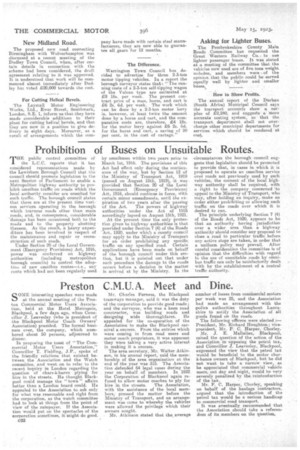Prohibition of Buses on Unsuitable Routes.
Page 8

If you've noticed an error in this article please click here to report it so we can fix it.
public control ;committee of the L.C.C. reports that i.t has considered representations made by the Lewisham Borough Council that the council should promote legislation in the next Session of Parliament to enable a Metropolitan highway authority to prohibit omnibus traffic on roads which the local authority consider are unsuited for such traffic. The borough council states that there are at the present time various services operating in the borough which traverse roads other than main roads, and, in consequence, considerable damage has been occasioned both to the roads and to the property abutting thereon. As the result, a heavy expenditure has been involved in respect of the maintenance and repair or reconstruction of such roads.
Under Section 20 of the Local Government (Emergency Provisions) Act, 1916, power was conferred on highway authorities (including metropolitan borough councils) to control the adoptioa of new omnibus routes—i.e., any route which had not been regularly used
by omnibuses within two years prior to March 1st, 1916. The provisions of this Act had effect only during the continuance of the war, but by Section 12 of the Ministry of Transport Act, 1919 (passed on .August 15th, 1919), it was Provided that Section 20 of the Local Government (Emergency Provisions) Act, 1916, should continue in force, With certain minor amendments, until the expiration of two years after the passing of the Act. The powers of highway authorities under the Act of 1916 accordingly lapsed on August 15th, 1921.
At, the present time the only protection given to highway authorities is that provided under Section 7 (4) of the Roads -Act, 1920, under which a county council may apply to the Ministry of Transport for an order prohibiting any specific traffic on any specified road. Certain applications have been made on behalf of the borough council under this section, but it is pointed out that under such procedure the damage to the roads occurs before a decision in the matter is arrived at by the Ministry. In the -circumstances the borough council suggests that legislation should be promoted to provide that, in cases in which it is proposed to operate an omnibus service over roads not previously used by such vehicles, the consent of the local highway authority shall be required, with a right to the company concerned to appeal to the Ministry of Transport, who may, after holding an inquiry, make an order either prohibiting or allowing such traffic on the roads over which it is desired to run.
The principle underlying Section 7 (4) of the Roads Act, 1920, appears to be that an authority having jurisdiction over a wider area than. a highway authority should consider any proposal to close a road to particular traffic before any active steps are taken, in order that a uniform policy may prevail. After careful consideration the committee is of opinion that, the difficulties with regard to the use of unsuitable roads by omnibus traffic can only be satisfactorily dealt with by the establishment of a central traffic authority.






























